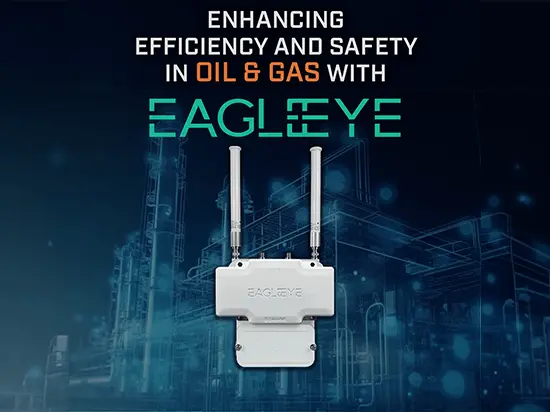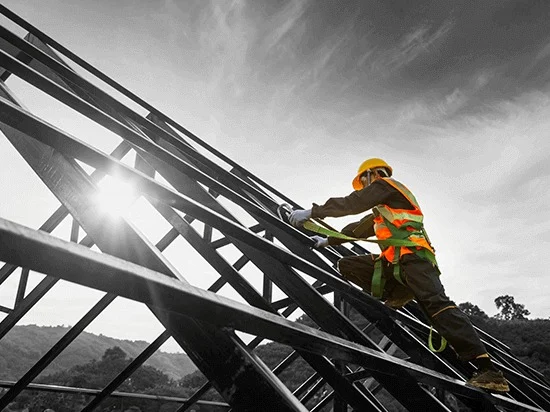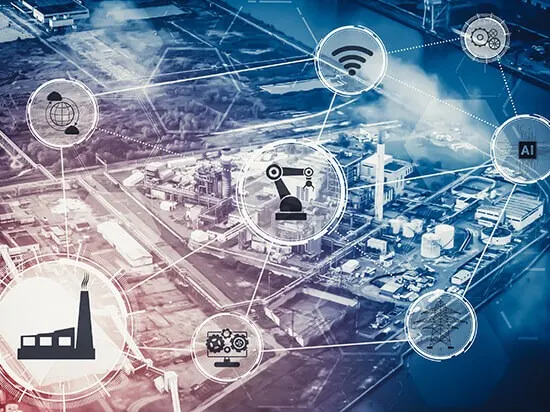RTLS For Oil & Gas Industry

Acceptance of RTLS technology is a critical step in improving safety and productivity in the petrochemical industry. Using real-time data to conduct meaningful performance measurements and analyses assists businesses in identifying opportunities for improvement and optimizing processes. Similarly, effective management review and forecasting processes allow for efficient resource management by making smart decisions based on accurate data.
On the other hand, the oil & gas industry is one of the most significant sectors globally and entails highly hazardous working conditions. Ensuring the safety of both field workers and facilities is a primary and critical concern in this industry. Maintaining occupational safety necessitates the safe operation of personnel and equipment in refineries, which is crucial. Significant gains in occupational safety and efficiency can be achieved in the petrochemical industry thanks to RTLS technology.
Real-Time Location Systems (RTLS) can bring about a significant transformation in terms of safety and efficiency in the oil & gas industry. Real-time location tracking and data analysis enable the management of operations in a safer and more effective manner. The use of RTLS systems in critical areas such as employee safety, monitoring hazardous zones, and equipment and inventory management reduces risks and contributes to the more efficient execution of operations. This, in turn, enhances the safety of both personnel and facilities in the oil & gas industry, while offering the potential to optimize operational costs.
However, the petrochemical industry is typically comprised of large facilities that house pipelines, tanks, equipment, and structures containing large amounts of iron. Because of the high concentration of iron, wireless communication frequencies quickly attenuate and interfere with signals. Because iron is magnetic, it absorbs or reflects electromagnetic signals. This can have an impact on wireless communication signal strength, making signal transmission difficult and causing connectivity issues.
In this context, EagleEye, developed through the collaboration between Cisco and Wipelot, stands out as an RTLS solution designed to withstand challenging industrial conditions.
What is Wipelot Eagleeye?
Wipelot EagleEye, a solution developed in collaboration between Cisco and Wipelot, combines secure Wi-Fi connectivity with integrated UWB-based real-time location tracking technology. It offers a unified system infrastructure. With high-precision location tracking, EagleEye has the ability to track the exact positions of individuals, vehicles, and equipment, enhancing visibility for businesses.
EagleEye is specifically designed for secure usage. It is equipped with certified hardware suitable for environments with fire or explosion risks. Designed for use in petrochemical refineries and harsh industrial environments with high iron density. Additionally, it is water, dust, and shock-resistant, ensuring reliable use in field conditions.
Enhancing Industrial Safety in Oil & Gas Plants with RTLS Technology
Wipelot EagleEye RTLS technology provides significant advantages in terms of worker safety in the oil & gas industry.
- Worker Safety: Wipelot EagleEye technology serves as a crucial tool for enhancing worker safety in the oil & gas industry. Real-time location tracking allows continuous monitoring of employee positions, enabling prompt intervention during emergencies. For instance, in the event of an accident, the employee's location can be quickly determined, and emergency response teams can be directed accordingly. This provides a significant advantage in ensuring worker safety.
- Hazard and Risk Monitoring: EagleEye facilitates the monitoring of environmental parameters such as pressure, temperature, humidity, wind, and sound in areas or zones that require tracking. This helps in keeping hazardous areas and the personnel working in those areas safe.
- Equipment and Inventory Management: It offers great convenience in tracking and managing equipment and inventory within the facilities. Tracking the exact locations and movements of equipment enables more efficient resource utilization. Additionally, it assists in optimizing operational processes such as stock management and inventory tracking.
- Operational Efficiency: Operational efficiency is of utmost importance in the oil & gas industry. Real-time data collection and analysis capabilities enable a better understanding of processes and workflows. This facilitates reducing time losses, improving workflows, and optimizing operational costs.
- Emergency Management: EagleEye technology greatly contributes to emergency management in oil & gas plants. Swiftly determining the locations of employees during emergencies enables the effective implementation of evacuation plans. Furthermore, it can be used as a valuable tool for simulating and improving emergency scenarios.
Maximizing Productivity and Cost-effectiveness with RTLS Technology in the Oil & Gas Industry
Wipelot Eagleeye’s utilization in the oil & gas industry not only enhances occupational safety but also contributes to increasing operational efficiency and reducing costs. Leveraging data-driven decision-making offers significant advantages in optimizing processes, improving efficiency, and enhancing safety.
- Equipment Tracking and Management:EagleEye can be employed to monitor and manage the precise location of equipment within oil & gas facilities. Real-time tracking of equipment minimizes time losses and enables more effective utilization. Additionally, it provides crucial insights to optimize maintenance programs and facilitate prompt interventions during equipment failures.
- Inventory Management and Control: EagleEye has the potential to improve inventory management and control in the oil & gas industry. Real-time tracking of materials within storage facilities and comprehensive inventory control prevent stock shortages and optimize material flow, offering a substantial advantage.
- Enhancement of Operational Processes: It can assist in improving operational processes in the oil & gas industry. Real-time data collection and analysis capabilities facilitate the monitoring, evaluation, and optimization of processes. Identifying and improving critical areas contribute to reducing time losses, enhancing productivity, and increasing operational efficiency.
- Workforce Management:EagleEye enables the enhancement of workforce management by tracking the locations of employees. Location information of employees provides valuable data for workload balancing, workforce deployment, and improving worker productivity. Effective management of labor resources is achieved, fostering a more efficient working environment.
- Security and Emergency Management: Continuous monitoring of employee locations through EagleEye ensures rapid and effective responses during emergencies. Additionally, it provides valuable data for simulating and improving emergency scenarios, enhancing security measures.
RTLS Technology in Oil & Gas: Safety, Efficiency, and Emergency Response
How does RTLS improve worker safety in the oil and gas industry?
RTLS enables real-time tracking of workers, allowing instant location awareness during emergencies. It helps ensure rapid response and effective evacuation, significantly enhancing occupational safety in hazardous environments.
What challenges does RTLS address in oil and gas facilities?
In high-density metal environments like refineries, signal interference can affect connectivity. Wipelot’s EagleEye system is engineered to overcome these challenges by combining certified UWB technology with secure Wi-Fi infrastructure.
How can RTLS contribute to equipment and inventory management?
RTLS helps track the real-time location and movement of equipment and inventory, allowing more efficient resource use, minimizing downtime, and streamlining maintenance and logistics operations.
What role does RTLS play in emergency response planning?
By continuously monitoring personnel and environmental conditions, RTLS supports real-time decision-making, facilitates evacuation procedures, and provides actionable data for improving future emergency scenarios.
Why is RTLS essential for operational efficiency in oil and gas operations?
RTLS systems like EagleEye enable data-driven monitoring of workflows, helping to identify inefficiencies, balance workforce distribution, and optimize maintenance and logistics processes, ultimately reducing operational costs.
Oil & gas plants are only as safe as their workers. However, the industry has recognized that occupational safety can be improved by continuously monitoring personnel, equipment, and environmental parameters within the facility. The EagleEye RTLS system's advantages present an effective means of improving both worker safety and operational efficiency in the oil and gas industry. Contact us to learn how we can help you improve your safety measures and optimize your operations.


